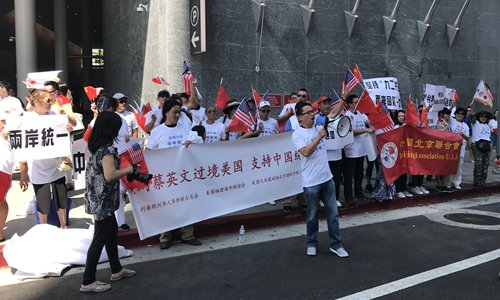HOME >> OPINION
Trump’s move on Kurds sparks concern on Taiwan island
By Wang Shushen Source:Global Times Published: 2019/10/30 22:18:42

Chinese demonstrators sing songs and chant slogans while waiting for the arrival of Taiwan leader Tsai Ing-wen in Los Angeles on Sunday. As Tsai arrived at the Intercontinental Hotel, she was greeted by peaceful Chinese demonstrators of all ages and from all walks of life. They were holding flags, banners and signs bearing the slogan "One China." The crowd began chanting "One China!" and "Oppose Taiwan Independence!" as Tsai pulled into the hotel. Photo: Wang Rujun
People on Taiwan island have been confused by two different voices - "relying on the US for security" versus "the US is untrustworthy." After US President Donald Trump took office in 2017, the "America First" doctrine became the core of the country's foreign policy. Trump haggles over every ounce with US allies and even sacrifices their interests to serve "America First." In October, Trump abandoned Americans partners in the majority Kurdish Syrian Democratic Forces, which fought the Islamic State side by side with US troops. Trump's move has drawn strong opposition from within the US and concerned Taiwan island.
Some pointed out that under Taiwan regional leader Tsai Ing-wen's policy of relying on the US to confront the Chinese mainland, the island is more dependent on the US than the Kurds while facing uncertain future because of Trump.
At the end of 1978, then US president Jimmy Carter announced to end diplomatic relations with the island and withdraw troops from there. This was regarded on the island as a historical record of the US abandoning Taiwan. Since then, similar decisions have been made or proposed in the US and concerned the island.
Some Americans believe that the Taiwan question can be used as a bargaining chip to make a big deal with China. Others argue that China's determination for reunification will not change, so that eventually abandoning the island will allow the US to avoid getting involved in a military conflict across the Taiwan Straits.
The Tsai administration refused to recognize the 1992 Consensus and promoted "Taiwan independence" to escalate cross-Straits tensions. Some American scholars believe Tsai's separatism will lead to unpredictable cross-Straits conflicts, and the US should keep distance from the island, a "time bomb," to prevent it from backfiring. From this perspective, the theory of US abandoning Taiwan is aimed at gradually reducing and terminating the country's commitment to the island with US national interests as the starting point.
Amid China-US strategic games and strained ties between the Chinese mainland and Taiwan island, residents on the island increasingly distrust the Trump administration, worrying that they will be used as a bargaining chip by the US and even be sold some day in the future in exchange for trade cooperation with China.
Besides, they worry that the US won't risk giving them a hand if the Chinese mainland determines to solve the Taiwan question for good. Although the US approved the Taiwan Relations Act and sells weapons to the island based on it, the Act didn't state clearly whether the US will help defend the island. The gap in military strength between China and the US has narrowed since the Taiwan Straits crisis in 1996, and the US military is unable to effectively defend the island anymore.
The Trump administration has included Taiwan in the Indo-Pacific strategy and the forefront of strategic competition with China, and thus triggered reflection on the island: Is this consistent with Taiwan's interests? In particular, Taiwan residents are worried that Tsai's one-sided policy toward the US will push the island into the vortex of a China-US contention, hurting itself before benefiting.
In recent years, the island's society has clearly felt that when the Trump administration frequently plays the Taiwan card against the Chinese mainland, including announcing arms sales to the island, signing Taiwan-related bills and promoting mutual high-level exchanges, Taiwan actually loses more. The island's space for international activities has been shrinking.
The Trump administration's support for Taiwan is mainly in service of US strategic needs. The Tsai administration has promised to purchase more US agricultural products to cater to the Trump administration but failed to bring the US to the table for a free trade agreement. In contrast, the island is becoming increasingly marginalized in regional economic growth.
The Tsai administration's complete reliance on the US and actively being the latter's chess piece have met with more suspicions on the island. The Kuomintang and mayor of Taipei Ko Wen-je, who is chairman of the Taiwan People's Party, all criticized Tsai's policy for putting Taiwan in danger and making the island a pawn of the US.
In the future, the power gap between China and the US will continue to narrow, and their respective influence on the cross-Straits situation will undergo major changes. Voices calling the US unreliable will grow louder on the island.
The author is an associate research fellow at the Institute of Taiwan Studies of the Chinese Academy of Social Sciences. opinion@globaltimes.com.cn
Posted in: VIEWPOINT